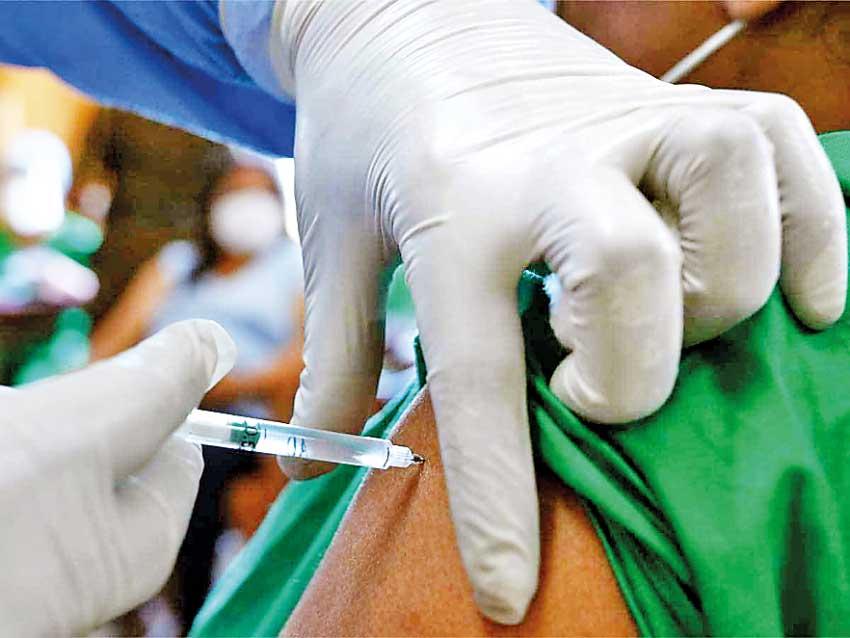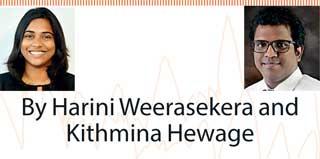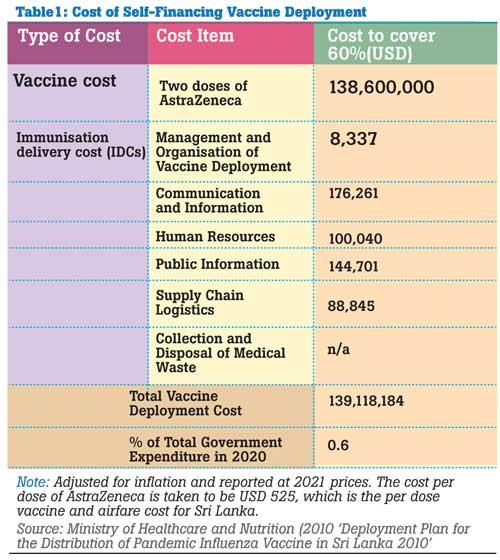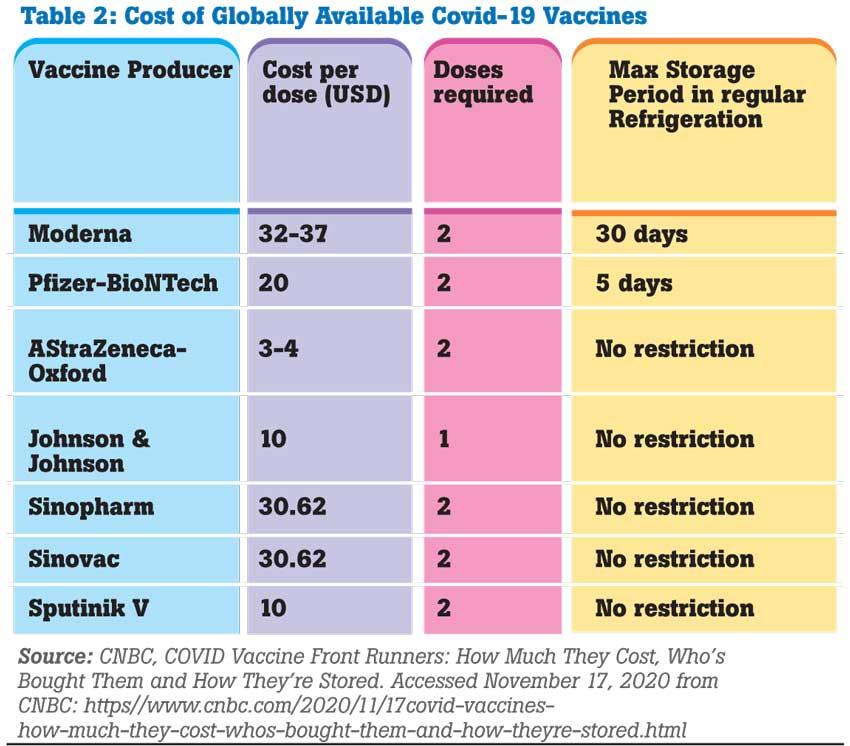06 May 2021 - {{hitsCtrl.values.hits}}

 An effective vaccination strategy is a necessity for countries to move beyond COVID-19. However, it also requires careful policymaking to balance the financial cost of purchasing and delivering vaccines while stimulating economic growth.
An effective vaccination strategy is a necessity for countries to move beyond COVID-19. However, it also requires careful policymaking to balance the financial cost of purchasing and delivering vaccines while stimulating economic growth.
This article, based on a recent IPS analysis, provides an overview of the approximate costs associated with the COVID-19 vaccination rollout in Sri Lanka and evaluates policy options to finance the initiative.
Assessing costs
While there is no universally agreed level, considering the emergence of new variants, many experts agree that a country should vaccinate around 80 percent of its population to achieve herd immunity against COVID-19.
 This translates to 17.5 million Sri Lankans. Thus far, Sri Lanka has received or is expected to receive vaccine donations and other financial assistance from the likes of the World Health Organization’s COVAX Facility to cover approximately 20 percent of the population.
This translates to 17.5 million Sri Lankans. Thus far, Sri Lanka has received or is expected to receive vaccine donations and other financial assistance from the likes of the World Health Organization’s COVAX Facility to cover approximately 20 percent of the population.
Based on publicly available proxy data, as detailed in Table 1 below, assuming that 20 percent of the population will be financed through the WHO COVAX scheme, the total cost of self-financing another 60 percent of the population is US$ 139.1 million. These costs include both the cost of purchasing the cheapest vaccine (AstraZeneca-Oxford) and the immunisation delivery costs.
In a recent study, the World Bank estimates that for the South Asian region, the average per person vaccination cost amounts to US$ 12 to receive one dose of the COVID-19 vaccine, under certain assumptions. This costing consists of the full vaccine deployment cost per person, which includes the vaccine dosage cost along with the international airfare and other delivery costs.
Using this basis of costing, financing two doses of the vaccine for 60 percent of Sri Lanka’s population would amount to US$ 336 million. This is over double the minimum estimate made earlier using local proxy data. As such, a range of US$ 140-336 million (Rs.27-66 billion) can be treated as a minimum and maximum estimate range for financing the long-term vaccination strategy in Sri Lanka.
This amounts to 0.6-1.4 percent of total government expenditure for 2020, which is a relatively small proportion of the country’s total government expenditure. For context, the health sector was allocated 4.8 percent of total government expenditure in 2020. Having said that, the estimated costs range between 12 and 29.5 percent of the Ministry of Health’s total expenditure for 2021.

Furthermore, given difficulties in securing all necessary vaccines from a single producer (e.g. AstraZeneca) due to supply shortages, Sri Lanka has already moved towards purchasing Sputnik V and Pfizer vaccines, which are more expensive than AstraZeneca, and therefore will increase costs. The cost increase will be significant given that other vaccines are two to six times more expensive than a dose of Astra-Zeneca (Table 2).
Given these realities, Sri Lanka will need to cover these costs through one or a combination of: (a) reallocating existing budgetary commitments; (b) receiving more bilateral and multilateral vaccine donations or financial assistance; or (c) self-financing through targetted tax policies and future borrowings.
Reallocating budgetary commitments
Notably, the government did not budget for a vaccination strategy in its National Budget for 2021. As such, any spending would have to be allocated through an emergency budgetary allocation.
The government could potentially reallocate funding from other sectors or even reallocate from within the health sector. These reallocations, for example, could occur through built-in fiscal space for public investments in the budget, postponements or revisions to non-essential government spending initiatives such as non-essential small-scale infrastructure projects.
However, the extent to which such revisions can be incorporated is greatly limited by the economic conditions under which this vaccination initiative is taking place. Some of these small-scale infrastructure projects, for instance, are geared towards stimulating the economy.
Sri Lanka’s post-COVID-19 economic recovery is dependent on adequate government spending to stimulate growth, and there has already been a significant amount of spending rationalisation that has taken place.
Furthermore, the government will be required to ensure that the broader public health sector is not compromised in any form simply to fund the COVID-19 vaccination initiative as that may have further severe long-term repercussions.
Self-financing
Given the current economic climate, the government is unlikely to increase direct taxes in the immediate future. Increasing indirect taxes such as import tariffs are also likely to be counter-productive since imports are restricted.
Rather, a tax rationalisation on luxury goods and a sin-tax rationalisation on alcohol and cigarettes could generate a significant amount of revenue that can be directed towards the vaccination drive.
For instance, a recent study by IPS estimated that government revenue could be increased by Rs. 17 billion by 2021, and Rs. 37 billion by 2023, if taxes on cigarettes are streamlined and raised in line with inflation.
This additional revenue can finance the vaccination strategy such that it reaches the midpoint of the study’s cost estimation range of Rs. 20-67 billion.
A targeted tax intervention achieves the dual aim of raising the required funds to vaccinate the public while simultaneously ensuring that the government’s broader macroeconomic stimulus initiatives can continue unimpeded.
If the government is unwilling to finance the entire cost through a targetted tax intervention, even a partial self-financing measure would reduce the necessity for the government to depend on further loans to cover the cost.
Best option
A basic economic impact analysis by IPS found that the vaccination rollout would generate an additional 30.6 billion in national output, and an extra value addition of Rs. 26 billion. Besides, the country’s economy will benefit additionally due to the indirect impacts associated with the public health benefits of a vaccinated populace.
Considering these factors, the government is best off pursuing a medium-term self-financing option through targetted tax interventions and if required, through external financing. The challenge for Sri Lanka is to secure adequate funding without compromising on its investments in broader public health and social welfare initiatives as weaknesses on those fronts can undermine the success of vaccinating the public from COVID-19.
From a budgetary perspective, the cost of vaccinating the public fast will also be cheaper than the cost of continuous PCR testing, managing quarantine centres and cluster associated lockdowns over a prolonged period.
In addition to securing funding, receiving an adequate supply of vaccine doses for the country to reach its vaccination coverage targets remains uncertain as we progress further into 2021.
To learn more, read IPS’ Policy Discussion Brief (PDB) ‘Fiscal Implications of Vaccinating Sri Lanka Against COVID-19’.The PDB is based on a conference paper presented at the World Bank’s 7th South Asia Economic Policy Network Virtual Conference on Vaccinating South Asia held on 4th March 2021.
(Harini Weerasekera is a Research Economist at the Institute of Policy Studies of Sri Lanka (IPS) with research interests in the areas of taxation, labour and migration, and econometrics and economic modelling. She holds a BSc in Economics from University of London International Programmes and a BA in Economics from the University of Colombo, with First Class Honours. She also graduated with an MSc in Economics from the University of Warwick where she authored a thesis on border tax evasion in Sri Lanka. Kithmina Hewage is a Research Economist at the Institute of Policy Studies of Sri Lanka (IPS) and a member of the World Economic Forum’s Expert Network. His research interests include international political economics, foreign direct investment, international trade policy, and private sector development, with a focus on regulatory reforms. He is a member of government taskforces in relation to domestic economic policy reforms and is a national consultant to the International Trade Centre (ITC). He has published articles in several international journals and other national and international outlets. Kithmina completed his undergraduate degree at Johns Hopkins University and an MSc in International Public Policy at University College London-UCL).
23 Dec 2024 8 hours ago
23 Dec 2024 23 Dec 2024
23 Dec 2024 23 Dec 2024
23 Dec 2024 23 Dec 2024